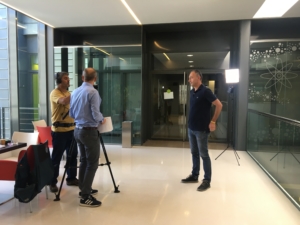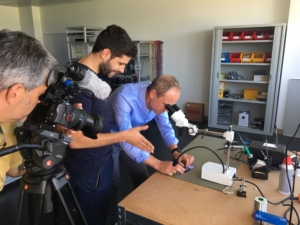Euronews features Quantum Communications
Last week, Euronews featured a piece on Quantum Technologies and how these hold an amazingly great potential for Cybersecurity, a field that aims to protect the increasing amounts of citizens’ data digitally transmitted, such as Health records, Financial transactions, Voting, among others.
Science reporter for Futuris, Jeremy Wilks, had a chance to talk with the coordinators and partners of the Quantum Flagship and its projects QRANGE (University of Geneva) and CiViQ (ICFO- Barcelona) to get an overview of what is being done in the field of quantum communications and quantum technologies in general.
The first stop was the University of Geneva, where Prof. Hugo Zbinden, coordinator of the QRANGE project, had the chance to present the project and show a quantum random number generator chip, which generates millions of bits per second, which can be integrated into devices such as smartphones, as well as used in many applications. When talking about unhackable technologies, Zbinden stated that “The chip itself may be, but it will be integrated into a more complex system, and you could still imagine that there are some problems in implementation. But the basics, the physics, is unhackable“.
At Geneva, the reporter was able to talk with Prof. Rob Thew, Strategy and Structuring Work Package coordinator of the Quantum Flagship, who provided a global perspective of the initiative, its mission, vision and objectives for the future development of quantum technologies in the fields of Communications, Sensing, Metrology, Simulations, and Computing. The ultimate goal of the initiative is to converge all these fields into creating the Quantum Internet.
The second stop was ICFO in Barcelona, where Euronews talked with Valerio Pruneri, coordinator of the CiViQ project, who gave an overview of the project and made emphasis on what quantum communications is, and why quantum cryptography could provide a completely new approach transmitting information in a completely secure way. In particular, he talked about quantum key distribution (QKD), which uses a quantum random number generated key to encrypt the information with a quantum key, while transmitting the information in a traditional/classical way. Such approach holds great potential in terms of building a super-secure internet, allowing quantum technologies to be integrated into current existing infrastructures.
As Prof. Valerio Pruneri, leader of the Optoelectronics group at ICFO, pointed out, “Your data will be protected, for example, your financial or health data. Also from a defence and security point of view, there will be a significant benefit, not to mention to secure power grids or transport grids“. While at ICFO, members of the Optoelectronics group Jennifer Aldama, Raju Valivarthi and Sebastian Etcheverry were able to show the news media an experimental setup of how communications between two parties can be carried out using quantum technologies.
The final stop was Quside, where Dr. Carlos Abellán, CEO and co-founder, gave ideas on how a quantum random number generator chip could be used for, by stating “An example is the integration of these chips in server-type technology for security in data centres, and other examples include in connected cars, networks of Internet of Things devices and even mobile phones, which will gradually see the integration of these technologies“.
Prof. Valerio Pruneri, leader of the Optoelectronics group at ICFO
Dr. Carlos Abellán, Quside CEO and co-founder





